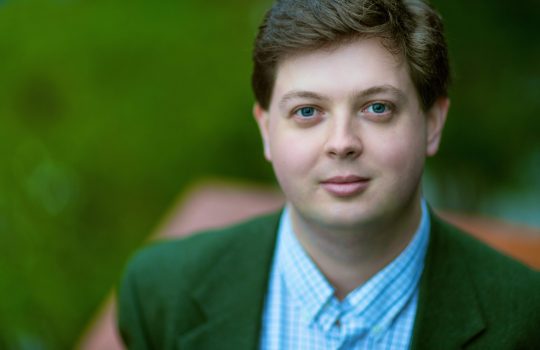BATAVIA, Ill.–Physicists fall in love, agonize over commitment, and think about quantum mechanics-all at the same time; and as a bonus, with the identical potential for emotional dysfunction afflicting most non-physicists.
“They [physicists] are not that different from other people,” asserts playwright Penny Penniston. “They are regular people who happen to be very bright. The difference lies in their being obsessed with science the way the rest of us are obsessed with other things that are important to our lives. I wanted to show how that passion for their work affects them in life, and love.”
“now then again,” the award-winning play about Fermilab physicists in love penned by Penniston and directed by her husband, Jeremy Wechsler, comes “home” to Fermilab on Saturday night, September 16 at 8:00 p.m. for a special presentation in Wilson Hall’s Ramsey Auditorium.
Kicking off Fermilab’s 2000-2001 Arts Series, ‘now then again’ will feature a pre-performance talk at 7 pm. by Wechsler and Penniston. After the play, the audience will have an opportunity to meet with cast members, and to speak with Fermilab physicists about the symmetries between romance and quantum mechanics-including the issue of whether time can flow backward. How the future affects the past is an integral element in the story of Ginny, a Fermilab postdoctoral student, and Henry, a Fermilab physicist suffering from social “stage fright.”
“now then again” won the Joseph Jefferson Award as the outstanding new work in Chicago theater for the 1999-2000 season. It added a second Jeff Award for Michael Rourke’s lighting design, and a nomination for Joseph Fosco’s original music. The response of theater critics has been equally enthusiastic: “One of the biggest critical and popular hits of Chicago’s theatrical year” (Chicago Tribune); “A deft little romantic screwball comedy with a very brainy twist” (Chicago Sun-Times).
Penniston characterizes the play as a simple love story against a backdrop of physics, but she was determined to stay as close as possible to the science involved. The idea of bending time came to her while reading John Cramer’s introduction to John Gribbin’s “Schroedinger’s Kittens and the Search for Reality.” Cramer outlined the transactional interpretation of quantum mechanics, with the concept of the future and past interacting across time. Penniston says she envisioned a story moving forward and backward in time, “seeing moments in our lives as an interaction between future and past, not just as a series of things that lead us forward.”
But she wanted the physics and Fermilab setting to be convincing. In addition to contacting Cramer, Penniston asked for help from Judy Jackson, Fermilab’s head of Public Affairs. Jackson’s search for volunteers brought a response from Morris Binkley, a veteran experimenter and inveterate theatergoer. He and his wife are subscribers to Chicago’s Steppenwolf Theater, and recently attended the London production of “Copenhagen,” which speculates on a wartime confrontation between physicists Werner Heisenberg and Niels Bohr over building at atomic bomb.
“The transactional interpretation of quantum mechanics is a subject which most physicists are interested in, but it’s not really crucial in our day-to-day physics,” Binkley explains. “Two particles interact and there is the possibility of going backwards in time. It doesn’t violate causality, but it does say there’s some fuzziness at the quantum level. It troubled Einstein back in the 1920s and ’30s, leading to his famous quote about God not playing dice.”
The collaboration involved an intense three-way storm of e-mail messages between Penniston, Binkley, and Cramer, a physicist at the University of Washington. Penniston credits Binkley with “always wanting us to be more precise;” in turn, Binkley appreciated the author’s self-taught but firm grasp of physics.
“The play is a light romantic comedy, but it has some interesting physics imbedded in it and the audience can get a little of the flavor of quantum mechanics,” Binkley says. “Penny clearly has read a lot and she knows her way around the subject and the lab. I’m happy for her because she worked very hard on this play.”
For Penniston, bringing the play to Fermilab brings added meaning to the play.
“In the areas of physics that people at Fermilab are studying, the universe is so complicated that it gives up only little tiny glimpses,” she says. “That tiny little piece of the picture is very similar to life. Being human in the universe, the image is so complicated that we can’t begin to understand it. We get little glimpses of a larger purpose, of a puzzle we fit together to learn our place in the universe. There is that kind of similarity in the complexity of the quest.”
She also knows she is facing the very people to whom quantum mechanics is the stuff of their everyday lives.
“This is going to be a very tough audience,” Penniston admits, “just as the toughest audience for ‘ER’ would be people who actually work in an emergency room.”
Media representatives wishing to attend this special presentation of “now than again” should contact Mike Perricone in Fermilab’s Office of Public Affairs (630-840-5678, e-mail mikep@fnal.gov) by September 9.
Tickets for “now then again” at Fermilab are $20 ($10 for ages 18 and younger), and are available by calling 630-840-ARTS (630-840-2787). For further information on all events in the Fermilab Arts Series, call (630)-840-ARTS, visit the Arts Series website (http://www.fnal.gov/culture/) or email audweb@fnal.gov.
Fermilab is a U. S. Department of Energy National Laboratory, manage



